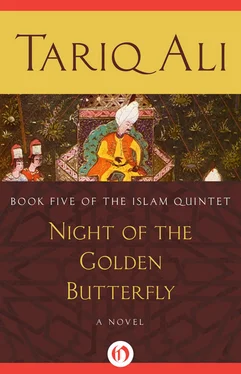The days creep by and my spirits are low. I want to leave here and go to Lahore.
I had felt the same about the place when I returned in 1984, even though at the Green’s Hotel end of Nathia the eyesores were some distance away, but even then there was much talk of Afghan refugees and nearby training camps for the jihadis fighting the Russians in Afghanistan. Many locals had complained that the Afghans were wrecking the environment. The region is much worse now. I try not to think about it too much. I was hoping to encounter an arresting penned portrait of Zahid in her diary, something that gave some account of his professional and personal trajectory. Jindié was never overtly political like her brother or like the rest of us, but her sympathies lay on what used to be our side. She would listen carefully, occasionally interject a remark or two and sometimes denounce poor Confucius as a mindless fanatic. The adjective was misplaced. I certainly wasn’t prepared for what I was about to read.
4 December 1986, DC
In a few hours today much of what I had built up in my life over the past nine and a half years has collapsed. All that remains are the children. This is much, much worse than the affair with the nurse. That never bothered me. In fact I was relieved, since I could never provide him with the passion that he needed so desperately. But this is unacceptable. He came home at the usual time. Halfway through dinner he tells me in as casual a voice as he can manage that he has decided to join the Republican Party. The Fatherlandi doctors in the United States are divided. The new arrivals gravitate towards the Democrats or are apolitical. The older settler doctors, now earning small fortunes, go in the direction their investments take them. Reagan is better for business so they go with the Republicans. Zahid used to denounce them as tarts. He’s become one himself. It marks a real degeneration and a big shift in sensibilities. How long can I live with him? Till the children have left home? Five more years.
On a personal level I have no complaints. Our marriage was one of convenience. Neither of us pretended we were in love. We knew each other reasonably well and that helped. Better than marrying a complete stranger. There were no hidden corners in our lives. We both had our ghosts. He knew everything about D and me. I knew a few things about him and Anjum. Her loss had hurt him more than he would ever acknowledge. In the early days of our marriage I would try and draw him out, but the pain was too strong. He told me: ‘Talking about her to you or anyone else won’t help. If it did I would.’ I never mentioned her name again.
After he announced his new political affiliation, I left the room. He didn’t follow me to try and explain the philosophical leap that he had made. There was only one explanation. Opportunism born of greed. He is a doctor. He can turn the microscope on himself. I avoid him now. The children know that something’s wrong.
Today he tried to confront me. Pure bluster. He didn’t believe in it, but others had insisted. It would help the community of doctors from Fatherland. What did it matter to me, since I had never shown the slightest interest in politics. I let him wallow in self-pity for a while, before replying.
‘I was never political like you were, but the reason I liked you and married you was because I thought you had some integrity. Some principles in which you believed. That meant a lot to me. Now I find you loathsome. I can never respect you again. You’re no different from your colleagues who still organise gender-segregated dinners to show their affection for the old country. You’ve become one of them. If it weren’t for the children I would leave you now and make sure I hired a really good divorce lawyer.’
He didn’t reply and I couldn’t resist a final kick.
‘Dara was so right when he told me once that it wasn’t institutions like marriage that mattered. The only unions that work have to be based on genuine passions. Love and politics. ’
He was silent.
I told the children. They didn’t reply, either.
Poor Zahid. He must have been as stunned by this response as I was now. Did I say that to her? Slowly it came back. It must have been that night in the Shalimar Gardens. It had been a response to something she had said linking love to marriage. Eighteen at the time, she was limited in her experiences and had a fixed notion of the perfect lover-husband. She may well have identified with Dai-yu, the ethereal heroine in Cao Xueqin’s masterpiece, but surely her ideal lover couldn’t possibly be Bao-yu — or had the fiction become so real that it had impinged on reality? Even so, not Bao-yu. No. He was far too flaky. She had certainly changed since those days. Experience is often the best teacher, but what on earth had impelled her to stay on, and especially after the children left home? Habit? Convenience? I wanted answers. She had to come back soon. A fortnight was too far away.
The train had reached the Gare du Nord.
I WASN’T COMPLETELY SURE why I was in Paris. Zaynab was a pretext, since she was returning to London. I was too old to brush up my French. The time for j’aime, tu aimes, il aime, nous aimons was long gone. And an old and close friend here, Mathurin, a gifted composer, was no longer alive. Usually Matho was the first person I rang. We would meet within hours, debrief each other on the state of the world and the world of our personal lives, retire to a café near St-Germain, and there he would detail the latest atrocities of certain Parisian intellectuals, far gone in vanity and conceit, that we had both come to loathe. They were the ‘ultras’ of the new order: social, economic, political liberals, they hated their own radical pasts and now even opposed traditional conservative Gaullism and republicanism for being too gauchiste and étatiste. Their carpings, far from costing the intended targets any sleepless nights, simply provoked mirth.
Matho would provide me with rich gossip, complete accounts of what was really going on underneath the surface. Political and sexual affairs were effortlessly combined in his narrative. What angered him greatly was that even some of the French extreme left had become partially infected with the neoliberal ideology; Liberation acted as the principal conduit of these ideas and was often less interesting than the traditional conservative journals. The paladins of the financial markets were seen as bold crusaders, opening new paths for the subalterns of consumerist excess. It was not envy that had soured Mathurin. It was a mixture of contempt and anger with the new order. He would speak of some colleagues in the world of music as having become so tense that they stifled the music they were being paid to play. He would name names from the past, friends we had in common, women we both knew, and describe their current activities. He often spoke of one woman in particular, a particularly dogmatic ouvrieriste for whom he had kept a permanent space in his heart, a bit like the irritating reserved signs in public car-parks, who was now an enormously successful arms dealer and had bought herself a farm where she reared pedigreed horses and rode them as a leisure activity. We laughed. He was firmly convinced it would end badly for the turncoats.
‘And yet’, Matho would say in his gravelly voice, ‘I still miss her sometimes. There was something beautiful and soft underneath the hard exterior that she wore both then and now. Sadness can sometimes last for years. I composed a symphony to bid her farewell. She came to the premiere with one of her clients from the Gulf. They left after fifteen minutes. None of the critics liked the work. I think they were right. It was too sentimental, but it sold well. Too well in Paris and not at all well elsewhere. Later I discovered that a PR firm she used was buying the CDs in bulk from all the shops here. Strange gesture, but my bank was happy.’
Читать дальше












